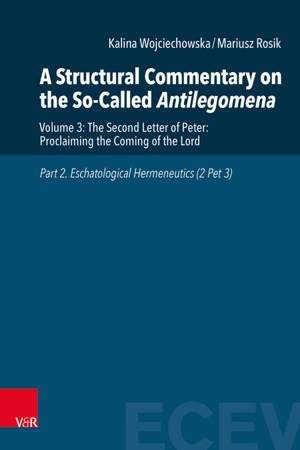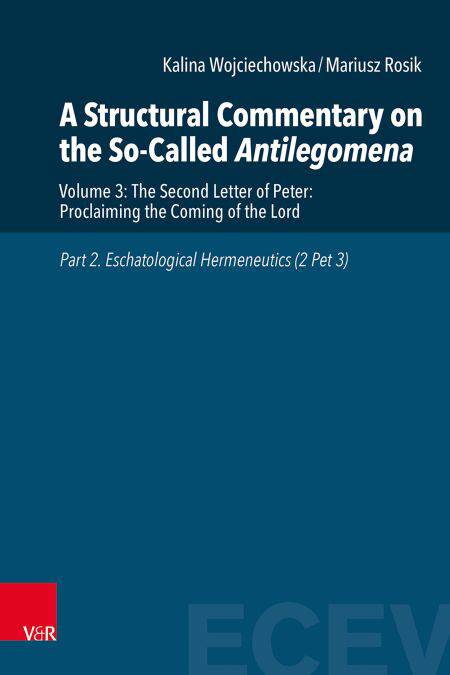
- Afhalen na 1 uur in een winkel met voorraad
- Gratis thuislevering in België vanaf € 30
- Ruim aanbod met 7 miljoen producten
- Afhalen na 1 uur in een winkel met voorraad
- Gratis thuislevering in België vanaf € 30
- Ruim aanbod met 7 miljoen producten
Zoeken
A Structural Commentary on the So-Called Antilegomena E-BOOK
Volume 3: The Second Letter of Peter: Proclaiming the Coming of the Lord. Part 2. Eschatological Hermeneutics (2 Pet 3)
Kalina Wojciechowska, Mariusz Rosik
€ 90,00
+ 90 punten
Uitvoering
Omschrijving
The structural approach facilitates exposure of the elements of eschatological teaching characteristic of 2 Peter's author with its correct or incorrect interpretation. Narratives drawn from Jewish tradition aim to show two attitudes towards the announcement of destruction: a positive attitude, signifying salvation, and a negative attitude, signifying annihilation. This pattern is transferred to the attitude towards prophetic and apostolic eschatological teaching. Part 1 of the commentary (2 Pet 1–2) focuses on the misinterpretation of this teaching by false teachers and their followers. Their eschatological scepticism is ridiculed and their grim fate described. As the starting point for this description and Peter's whole line of argumentation 2 Pet 2:3b is taken – the thesis is that God's inaction is only apparent, while judgment and punishment are inevitable, although only God knows when they will be executed.
Part 2 of the commentary (2 Pet 3) focuses on the proper interpretation of this teaching and on laying out the principles of the letter author's hermeneutics. This hermeneutic construes texts from Jewish tradition as foreshadowing and typologies of eschatological events. In explaining the principles of his hermeneutic, the letter's author drew on the creation story, which Jewish apocalypticism read inversely, to mark that the eschatological hermeneutics is rooted in tradition. The starting point of Peter's line of argumentation was taken to be 2 Pet 3:5.7 with its thesis of God's creative and destructive word and God's sovereign will regarding the preservation of creation and the appointment of the time of judgement. This thesis explains the apparent lack of divine action, which was also a major concern in Part 1 of the commentary (2 Pet 1–2).
Part 2 of the commentary (2 Pet 3) focuses on the proper interpretation of this teaching and on laying out the principles of the letter author's hermeneutics. This hermeneutic construes texts from Jewish tradition as foreshadowing and typologies of eschatological events. In explaining the principles of his hermeneutic, the letter's author drew on the creation story, which Jewish apocalypticism read inversely, to mark that the eschatological hermeneutics is rooted in tradition. The starting point of Peter's line of argumentation was taken to be 2 Pet 3:5.7 with its thesis of God's creative and destructive word and God's sovereign will regarding the preservation of creation and the appointment of the time of judgement. This thesis explains the apparent lack of divine action, which was also a major concern in Part 1 of the commentary (2 Pet 1–2).
Specificaties
Betrokkenen
- Auteur(s):
- Uitgeverij:
Inhoud
- Aantal bladzijden:
- 213
- Taal:
- Engels
- Reeks:
Eigenschappen
- Productcode (EAN):
- 9783647503677
- Verschijningsdatum:
- 16/06/2024
- Uitvoering:
- E-book
- Formaat:

Alleen bij Standaard Boekhandel
+ 90 punten op je klantenkaart van Standaard Boekhandel
Beoordelingen
We publiceren alleen reviews die voldoen aan de voorwaarden voor reviews. Bekijk onze voorwaarden voor reviews.












